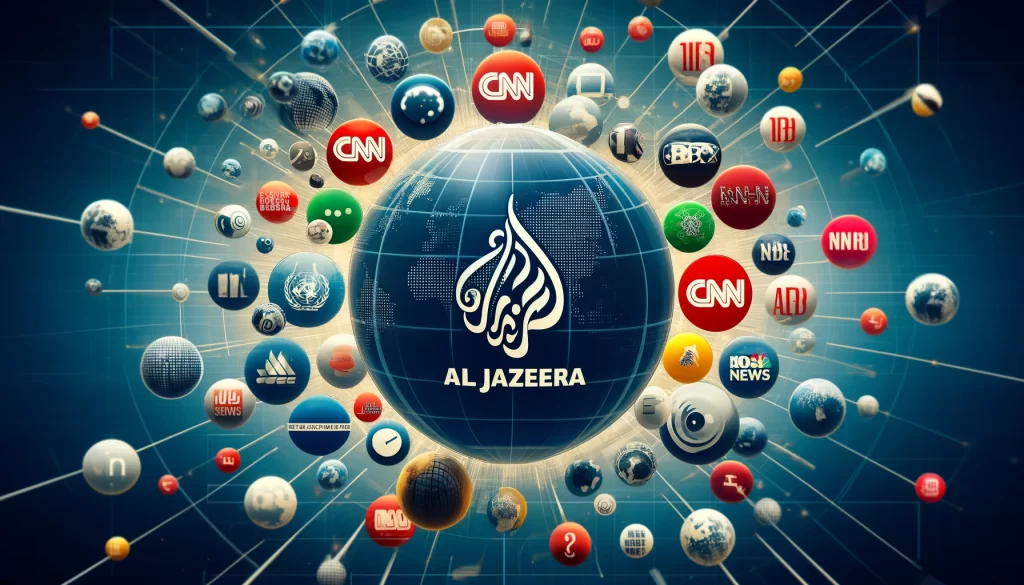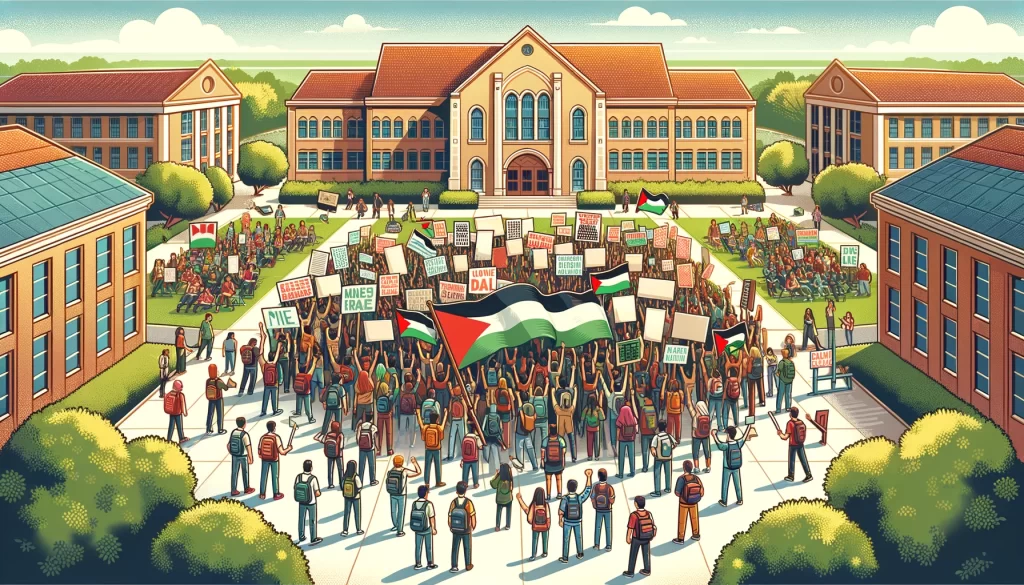Nick Wilson, a student at Cornell University, is deeply involved in monitoring the ongoing war in Gaza that began in October. As a pro-Palestinian activist, Wilson is quite selective about his news sources. He expresses skepticism towards mainstream American media’s coverage of Israel’s actions in Gaza, preferring to get his information from outlets he believes are more reliable and aligned with his views.
One of his trusted sources is Al Jazeera, an Arab news network. “Al Jazeera is the site that I go to to get an account of events that I think will be reliable,” Wilson stated. This preference for Al Jazeera over more familiar American media outlets is not unique to him; it is shared by many student protesters who are keen on finding on-the-ground and distinctly pro-Palestinian perspectives on the conflict.
Students like Wilson are turning to a variety of alternative media sources such as Jewish Currents, The Intercept, Mondoweiss, and independent Palestinian journalists on social media. They are driven by a desire to obtain detailed, firsthand information about the situation in Gaza.
This trend reflects a broader pattern among Generation Z, who increasingly distrust traditional media sources and seek information from a wide range of outlets. The recent ban by Israel on Al Jazeera’s local operations has only heightened the network’s credibility among these student protesters. They value the network’s extensive presence in Gaza and the sacrifices its journalists have made, including the lives of two Al Jazeera journalists since the war’s start.

Ben Toff, an associate professor of journalism at the University of Minnesota, noted, “Al Jazeera is sort of playing that role for a lot of younger Americans, in terms of getting a different perspective than they feel like they’re getting from U.S. media.” This sentiment is echoed by Alina Atiq, a student at the University of South Florida, who appreciates Al Jazeera for not presenting a Western-centric view on Middle Eastern issues.
Al Jazeera, funded by Qatar and headquartered in Doha, operates newsrooms in both English and Arabic. Its mobile apps have seen a significant surge in downloads in the U.S. since the onset of the war, indicating a growing interest among Americans. On social media, Al Jazeera English’s following has notably increased, reaching 1.9 million on TikTok and 4.6 million on Instagram.
The network’s Arabic channel is considered more openly pro-Palestinian compared to its English counterpart, which maintains a subtler bias, according to Hussein Ibish, a senior scholar at the Arab Gulf States Institute in Washington. However, the network’s coverage has faced criticism for potentially supporting armed resistance against Israel. Following accusations of being a “mouthpiece” for Hamas, the Israeli government shut down Al Jazeera’s operations in Israel for at least 45 days, a move the network called “baseless.”
In its defense, Al Jazeera insists that its reporting offers a balanced view, providing “diverse viewpoints and narrative and counter narrative.” It stresses that any claims of bias should be evaluated against its journalistic standards and practices.

The network’s dispute with the Israeli government has, if anything, reinforced its reputation among some students. Matthew Vickers, a junior at Occidental College, remarked, “It goes to show the extent to which Israel is afraid of the coverage and reportage of Al Jazeera.”
Student protesters often criticize mainstream American media like CNN, The Atlantic, the BBC, and The New York Times for their coverage of the Gaza conflict. They argue that these outlets do not adequately blame Israel for Palestinian casualties or scrutinize Israeli officials’ statements enough. They also believe that the coverage disproportionately focuses on antisemitism on college campuses rather than Islamophobia.
“There’s a fair amount of misinformation that is being fed to us by mainstream media, and just a clear bias when it comes to the Palestine issue,” said Cameron Jones, a Columbia University student and organizer with Jewish Voice for Peace.
This growing disillusionment with traditional media and the search for alternative perspectives have helped Al Jazeera regain some of the audience it lost in the United States after its American channel closed in 2016 due to low viewership and criticism of its coverage’s tone.
Ibish explains the network’s resurgence among university students as aligning with a “third-worldist, anti-imperial point of view,” which resonates with the perspectives of many college students today.
This article is based on the following article:

Background Information
By understanding these components, readers can better appreciate the nuances of the article and the broader implications of the issues discussed within it.
1. The Gaza Conflict
The Gaza Strip is a small region located on the eastern coast of the Mediterranean Sea, bordering Egypt and Israel. It has been a focal point of the Israeli-Palestinian conflict. This conflict, which has spanned over a century, centers on the disputed territorial claims between Jews and Arabs in the region. The modern phase of the conflict began in the mid-20th century with the establishment of Israel in 1948, which led to several wars and ongoing tensions.
2. Al Jazeera
Al Jazeera is a state-funded broadcaster in Doha, Qatar, which operates multiple TV channels and a website providing news coverage from around the world. It started broadcasting in 1996 and has grown to become one of the most influential Arab media outlets globally. Al Jazeera is known for its focus on news from the Middle East and has often been in the spotlight for its coverage of events that other networks might overlook or present from a different perspective.
3. Media Perspective and Bias
Media bias refers to the perceived or real bias of journalists and news producers within the mass media. This bias manifests in the selection of events and stories reported and how they are covered. The concept of media bias is sometimes used to frame media outlets as either “pro” or “anti” a particular issue or party, influencing public perception.
4. Student Activism
Student activism involves students advocating for various political, environmental, or social causes. Historically, student movements have been pivotal in societal changes and reforms. In the context of this article, student activists are particularly focused on the Israeli-Palestinian conflict, often organizing events, protests, or campaigns to express their support for Palestinian rights.
5. The Role of Social Media in Modern Activism
Social media platforms like Twitter, Facebook, Instagram, and TikTok have become significant tools for activists. They allow for the rapid dissemination of information, organization of events, and engagement with a broader audience. This has transformed how activism is carried out, making it easier to mobilize support and spread messages globally.
6. Criticism of Mainstream Media
Criticism of mainstream media often revolves around issues such as corporate ownership, political influence, and the centralization of media ownership, which critics argue can lead to a lack of diversity in viewpoints and a propensity towards supporting status quo policies or perspectives.

Debate/Essay Questions
- Was Israel justified in banning Al Jazeera’s operations due to allegations of bias, or does this act constitute a violation of press freedom?
- Is it the responsibility of the consumer to diversify their media sources to avoid bias, or should media outlets ensure a balanced view is provided?
- Has social media been more beneficial or harmful to the cause of social justice movements like those supporting Palestinian rights?
- What are the risks and benefits of relying on social media and independent journalists for news during conflicts?
Please subscribe to Insight Fortnight, our biweekly newsletter!
